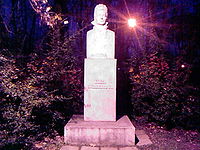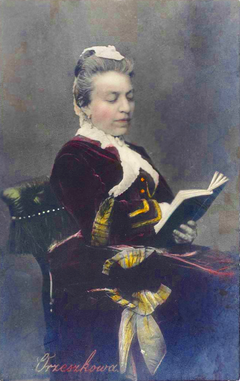- Eliza Orzeszkowa
-
Eliza Orzeszkowa Born 6 June 1841
Milkowszczyzna, Russian EmpireDied 18 May 1910 (aged 68)
Grodno, Russian EmpireOccupation novelist, essayist, publisher Notable work(s) Meir Ezofowicz, Nad Niemnem, Cham, Bene nati Spouse(s) Piotr Orzeszko
Stanisław NahorskiEliza Orzeszkowa (June 6, 1841 – May 18, 1910), was a Polish novelist and a leading writer of the Positivism in Poland during foreign Partitions. She was born to a noble Pawłowski family in Milkowszczyzna, and died in Grodno (now Hrodna, Belarus) nearby.[1] At the age of sixteen, Eliza married Piotr Orzeszko, a Polish nobleman twice her own age, who was exiled to Siberia after the January Uprising of 1863. They were legally separated in 1869.[2] She married again in 1894, after a 30-year-long loving relationship with Stanisław Nahorski who died a few years later.[3]
 Bust of Eliza Orzeszkowa, Warsaw
Bust of Eliza Orzeszkowa, Warsaw
Orzeszkowa wrote a series of 30 novels and 120 powerful sketches, dramas and novellas, dealing with the social conditions of her occupied country. Her novel Eli Makower (1875) describes the relations between the Jews and the Polish nobility; and Meir Ezofowicz (1878), the conflict between Jewish orthodoxy and modern liberalism. In 1888 Orzeszkowa wrote two novels about the Niemen River (now part of Belarus): Cham (The Boor) focused on the life of fishermen; and her most famous novel, Nad Niemnem (On the Niemen) – often compared to Pan Tadeusz – dealing with the issues of Polish aristocracy against the backdrop of political and social order. Her study on patriotism and cosmopolitanism appeared in 1880.[2] A uniform edition of her works was published in Warsaw between 1884–1888. Much of her output is available also in German translation.
In 1905 together with Henryk Sienkiewicz and Lev Tolstoy, Eliza Orzeszkowa was nominated for the Nobel Prize in Literature. The prize was awarded to Sienkiewicz. According to official records of the Nobel Prize committee, the idea of dividing the prize was rejected as an act of disparagement, and only the latter ended up as the laureate.[4]
Selected works
- Obrazek z lat głodowych 1866
- Ostatnia miłość, 1868
- Z życia realisty, 1868
- Na prowincji, 1870
- W klatce, 1870
- Cnotliwi, 1871
- Pamiętnik Wacławy, 1871
- Pan Graba, 1872
- Na dnie sumienia, 1873
- Marta, 1873
- Eli Makower, 1875
- Rodzina Brochwiczów, 1876
- Pompalińscy, 1876
- Maria, 1877
- Meir Ezofowicz, 1878
- Z różnych sfer, 1879–1882
- Widma, 1881
- Sylwek Cmentarnik, 1881
- Zygmunt Ławicz i jego koledzy, 1881
- Bańka mydlana, 1882–1883
- Pierwotni, 1883
- Niziny, 1885
- Dziurdziowie, 1885
- Mirtala, 1886
- Nad Niemnem (On the Niemen), 1888
- Cham (The Boor), 1888
- Panna Antonina (collection of novels), 1888
- W zimowy wieczór (collection of novels), 1888
- Czciciel potęgi, 1891
- Jędza, 1891
- Bene nati, 1891
- Westalka, 1891
- Dwa bieguny, 1893
- Melancholicy, 1896
- Australczyk, 1896
- Iskry (collection of novels), 1898
- Argonauci (The Argonauts),[5] 1900
- Ad astra. Dwugłos, 1904
- I pieśń niech zapłacze, 1904
- Gloria victis (collection of novellas), 1910
Journalism for social justice
- Kilka słów o kobietach (On women),[6] 1870
- Patriotyzm i kosmopolityzm, 1880
- O Żydach i kwestii żydowskiej, 1882
References
- ^ "Eliza Orzeszkowa" from the Encyclopædia Britannica. Retrieved September 22, 2011.
- ^ a b Prof. dr hab. Józef Bachórz, Eliza Orzeszkowa. Virtual Library of Polish Literature. Retrieved September 22, 2011.
- ^ Eliza Orzeszkowa. Słownik pisarzy polskich. Brykowisko. Retrieved September 22, 2011.
- ^ The Nobel Prize in Literature: Nominations and Reports 1901–1950
- ^ Project Gutenberg's "The Argonauts" by Eliza Orzeszko (aka Orzeszkowa). Translator: Jeremiah Curtin, 1901.
- ^ "Kilka słów o kobietach" by E. Orzeszkowa. Kujawsko-Pomorska Digital Library. Retrieved September 23, 2011.
 This article incorporates text from a publication now in the public domain: Chisholm, Hugh, ed (1911). Encyclopædia Britannica (11th ed.). Cambridge University Press.
This article incorporates text from a publication now in the public domain: Chisholm, Hugh, ed (1911). Encyclopædia Britannica (11th ed.). Cambridge University Press.
External links
Categories:- 1842 births
- 1910 deaths
- People from Hrodna Raion
- Polish nobility
- Polish essayists
- Polish novelists
- Polish political writers
- Polish women writers
- Women essayists
- Women novelists
Wikimedia Foundation. 2010.

